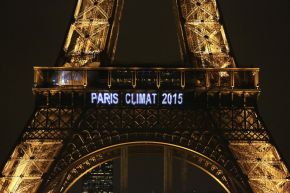Ecology, Energy, EU – Baltic States, Legislation, Lithuania, Real Estate
International Internet Magazine. Baltic States news & analytics
Wednesday, 24.04.2024, 04:35
Paris climate pact means no major problems for Lithuania
 Print version
Print version |
|---|
"The agreement is indeed good for Lithuania, although we pursued the single policies here as part of the European Union and will continue to do so. When it comes to objectives, we can easily achieve them now, as Lithuania used to have more polluting industry in the past than it does now," the minister told BNS Lithuania on Monday.
In his words, the Soviet-era apartment building renovation project, which is gaining pace, will be crucial in the implementation of the agreement along with development of wind and solar energy.
Nevertheless, Treciokas noted that the United Nations (UN) agreement is not legally binding, and Lithuania will implement it with economic development.
The energy sector along with transport and agriculture remain the main sources of pollution in Lithuania, he added.
"It will be a challenge for these sectors, however, there are sufficient new technologies that are not as expensive as they used to be, offering new opportunities for all sectors," said the environment minister.
In his words, the Paris climate agreement is in line with Lithuania's strategic steps towards energy independence.
"They are not interconnected, (…), however, we will have to invest there. Fuel or resources are not pollution in themselves, pollution is contained in emissions. We can burn oil and even coal in a way that does not pollute the environment but this requires investment in technologies and purification," said Treciokas.
"It involves a cost but is not impossible or incompatible," he added.
Speaking about the transport sector, the minister stated that Lithuania burns a relatively large amount of diesel fuel, which leads to substantial emissions of hard particles. He expressed hope that the Volkswagen scandal would cause automobile manufacturers "to invest and make the vehicles less polluting."
Meanwhile, the problem of public transport will have to be addressed in Lithuania's largest cities, said Treciokas.
"The use of public transport may help us reduce the pollution. Municipalities will have to think hard here and spend some money," he added.
The minister said Lithuanian farmers "should not be cornered" until the agriculture sector is not very intensive in the country.
After nearly two weeks of negotiations in the French capital, delegates of 195 countries Saturday approved an agreement that is expected to help slow down the global warming.








 «The Baltic Course» Is Sold and Stays in Business!
«The Baltic Course» Is Sold and Stays in Business!

